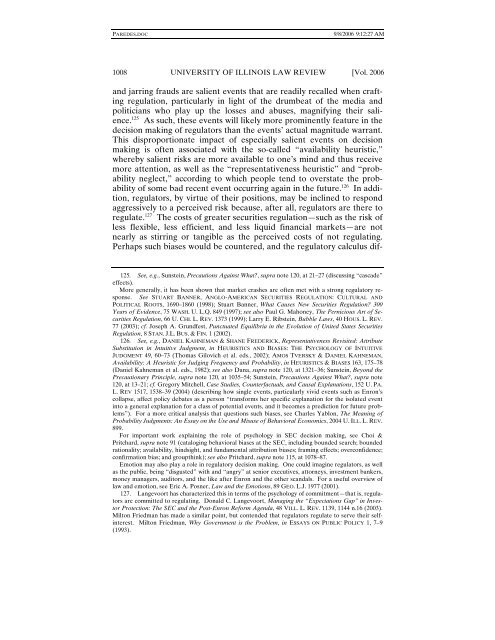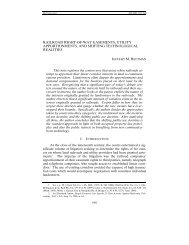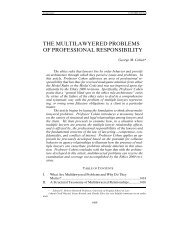on the decision to regulate hedge funds - University of Illinois Law ...
on the decision to regulate hedge funds - University of Illinois Law ...
on the decision to regulate hedge funds - University of Illinois Law ...
You also want an ePaper? Increase the reach of your titles
YUMPU automatically turns print PDFs into web optimized ePapers that Google loves.
PAREDES.DOC<br />
9/8/2006 9:12:27 AM<br />
1008 UNIVERSITY OF ILLINOIS LAW REVIEW [Vol. 2006<br />
and jarring frauds are salient events that are readily recalled when crafting<br />
regulati<strong>on</strong>, particularly in light <strong>of</strong> <strong>the</strong> drumbeat <strong>of</strong> <strong>the</strong> media and<br />
politicians who play up <strong>the</strong> losses and abuses, magnifying <strong>the</strong>ir salience.<br />
125 As such, <strong>the</strong>se events will likely more prominently feature in <strong>the</strong><br />
decisi<strong>on</strong> making <strong>of</strong> regula<strong>to</strong>rs than <strong>the</strong> events’ actual magnitude warrant.<br />
This disproporti<strong>on</strong>ate impact <strong>of</strong> especially salient events <strong>on</strong> decisi<strong>on</strong><br />
making is <strong>of</strong>ten associated with <strong>the</strong> so-called “availability heuristic,”<br />
whereby salient risks are more available <strong>to</strong> <strong>on</strong>e’s mind and thus receive<br />
more attenti<strong>on</strong>, as well as <strong>the</strong> “representativeness heuristic” and “probability<br />
neglect,” according <strong>to</strong> which people tend <strong>to</strong> overstate <strong>the</strong> probability<br />
<strong>of</strong> some bad recent event occurring again in <strong>the</strong> future. 126 In additi<strong>on</strong>,<br />
regula<strong>to</strong>rs, by virtue <strong>of</strong> <strong>the</strong>ir positi<strong>on</strong>s, may be inclined <strong>to</strong> resp<strong>on</strong>d<br />
aggressively <strong>to</strong> a perceived risk because, after all, regula<strong>to</strong>rs are <strong>the</strong>re <strong>to</strong><br />
<strong>regulate</strong>. 127 The costs <strong>of</strong> greater securities regulati<strong>on</strong>—such as <strong>the</strong> risk <strong>of</strong><br />
less flexible, less efficient, and less liquid financial markets—are not<br />
nearly as stirring or tangible as <strong>the</strong> perceived costs <strong>of</strong> not regulating.<br />
Perhaps such biases would be countered, and <strong>the</strong> regula<strong>to</strong>ry calculus dif-<br />
125. See, e.g., Sunstein, Precauti<strong>on</strong>s Against What?, supra note 120, at 21–27 (discussing “cascade”<br />
effects).<br />
More generally, it has been shown that market crashes are <strong>of</strong>ten met with a str<strong>on</strong>g regula<strong>to</strong>ry resp<strong>on</strong>se.<br />
See STUART BANNER, ANGLO-AMERICAN SECURITIES REGULATION: CULTURAL AND<br />
POLITICAL ROOTS, 1690–1860 (1998); Stuart Banner, What Causes New Securities Regulati<strong>on</strong>? 300<br />
Years <strong>of</strong> Evidence, 75 WASH. U. L.Q. 849 (1997); see also Paul G. Mah<strong>on</strong>ey, The Pernicious Art <strong>of</strong> Securities<br />
Regulati<strong>on</strong>, 66 U. CHI. L. REV. 1373 (1999); Larry E. Ribstein, Bubble <strong>Law</strong>s, 40 HOUS. L. REV.<br />
77 (2003); cf. Joseph A. Grundfest, Punctuated Equilibria in <strong>the</strong> Evoluti<strong>on</strong> <strong>of</strong> United States Securities<br />
Regulati<strong>on</strong>, 8 STAN. J.L. BUS. & FIN. 1 (2002).<br />
126. See, e.g., DANIEL KAHNEMAN & SHANE FREDERICK, Representativeness Revisited: Attribute<br />
Substituti<strong>on</strong> in Intuitive Judgment, in HEURISTICS AND BIASES: THE PSYCHOLOGY OF INTUITIVE<br />
JUDGMENT 49, 60–73 (Thomas Gilovich et al. eds., 2002); AMOS TVERSKY & DANIEL KAHNEMAN,<br />
Availability: A Heuristic for Judging Frequency and Probability, in HEURISTICS & BIASES 163, 175–78<br />
(Daniel Kahneman et al. eds., 1982); see also Dana, supra note 120, at 1321–36; Sunstein, Bey<strong>on</strong>d <strong>the</strong><br />
Precauti<strong>on</strong>ary Principle, supra note 120, at 1035–54; Sunstein, Precauti<strong>on</strong>s Against What?, supra note<br />
120, at 13–21; cf. Gregory Mitchell, Case Studies, Counterfactuals, and Causal Explanati<strong>on</strong>s, 152 U. PA.<br />
L. REV 1517, 1538–39 (2004) (describing how single events, particularly vivid events such as Enr<strong>on</strong>’s<br />
collapse, affect policy debates as a pers<strong>on</strong> “transforms her specific explanati<strong>on</strong> for <strong>the</strong> isolated event<br />
in<strong>to</strong> a general explanati<strong>on</strong> for a class <strong>of</strong> potential events, and it becomes a predicti<strong>on</strong> for future problems”).<br />
For a more critical analysis that questi<strong>on</strong>s such biases, see Charles Yabl<strong>on</strong>, The Meaning <strong>of</strong><br />
Probability Judgments: An Essay <strong>on</strong> <strong>the</strong> Use and Misuse <strong>of</strong> Behavioral Ec<strong>on</strong>omics, 2004 U. ILL. L. REV.<br />
899.<br />
For important work explaining <strong>the</strong> role <strong>of</strong> psychology in SEC decisi<strong>on</strong> making, see Choi &<br />
Pritchard, supra note 91 (cataloging behavioral biases at <strong>the</strong> SEC, including bounded search; bounded<br />
rati<strong>on</strong>ality; availability, hindsight, and fundamental attributi<strong>on</strong> biases; framing effects; overc<strong>on</strong>fidence;<br />
c<strong>on</strong>firmati<strong>on</strong> bias; and groupthink); see also Pritchard, supra note 115, at 1078–87.<br />
Emoti<strong>on</strong> may also play a role in regula<strong>to</strong>ry decisi<strong>on</strong> making. One could imagine regula<strong>to</strong>rs, as well<br />
as <strong>the</strong> public, being “disgusted” with and “angry” at senior executives, at<strong>to</strong>rneys, investment bankers,<br />
m<strong>on</strong>ey managers, audi<strong>to</strong>rs, and <strong>the</strong> like after Enr<strong>on</strong> and <strong>the</strong> o<strong>the</strong>r scandals. For a useful overview <strong>of</strong><br />
law and emoti<strong>on</strong>, see Eric A. Posner, <strong>Law</strong> and <strong>the</strong> Emoti<strong>on</strong>s, 89 GEO. L.J. 1977 (2001).<br />
127. Langevoort has characterized this in terms <strong>of</strong> <strong>the</strong> psychology <strong>of</strong> commitment—that is, regula<strong>to</strong>rs<br />
are committed <strong>to</strong> regulating. D<strong>on</strong>ald C. Langevoort, Managing <strong>the</strong> “Expectati<strong>on</strong>s Gap” in Inves<strong>to</strong>r<br />
Protecti<strong>on</strong>: The SEC and <strong>the</strong> Post-Enr<strong>on</strong> Reform Agenda, 48 VILL. L. REV. 1139, 1144 n.16 (2003).<br />
Milt<strong>on</strong> Friedman has made a similar point, but c<strong>on</strong>tended that regula<strong>to</strong>rs <strong>regulate</strong> <strong>to</strong> serve <strong>the</strong>ir selfinterest.<br />
Milt<strong>on</strong> Friedman, Why Government is <strong>the</strong> Problem, in ESSAYS ON PUBLIC POLICY 1, 7–9<br />
(1993).




